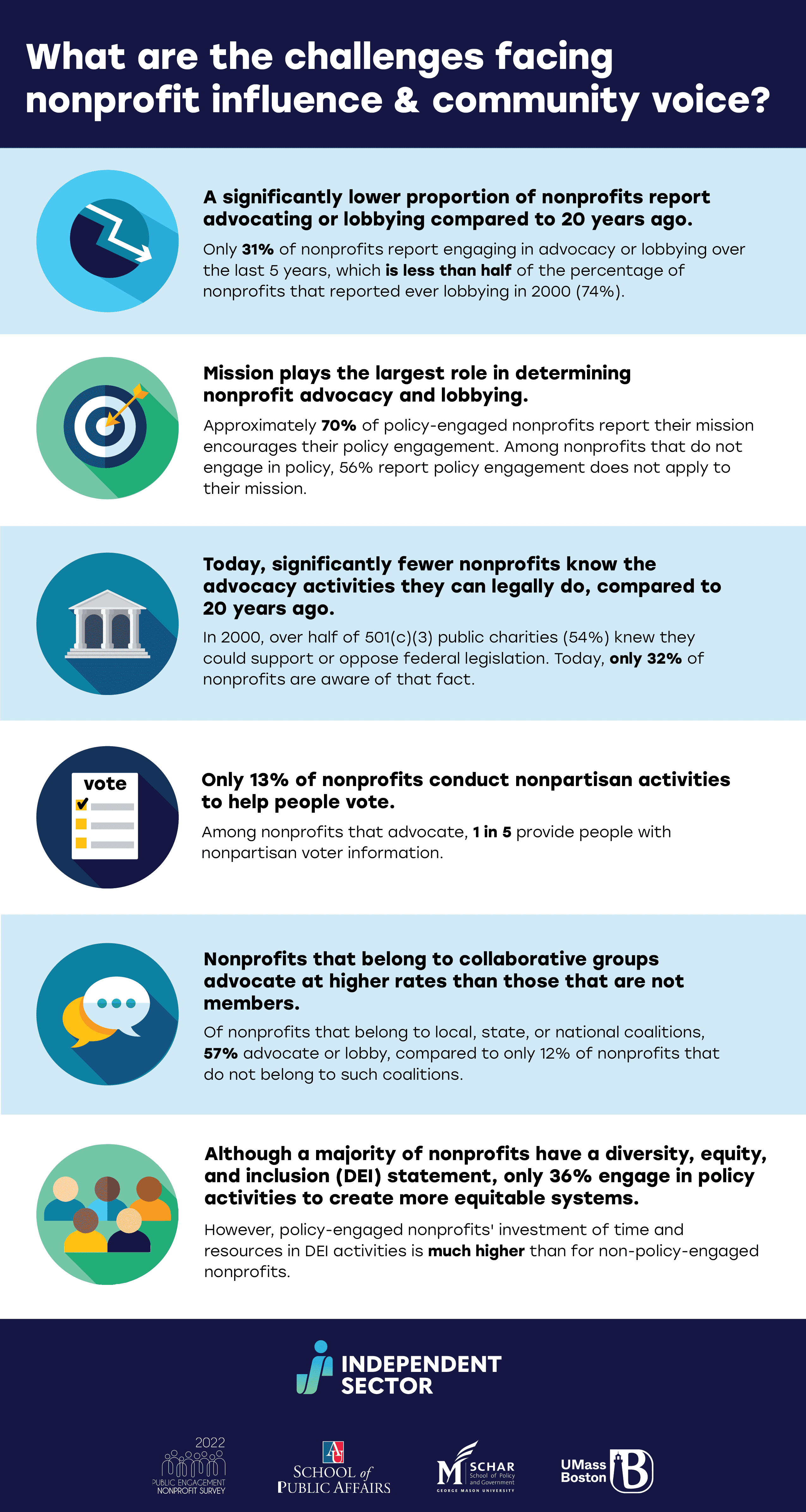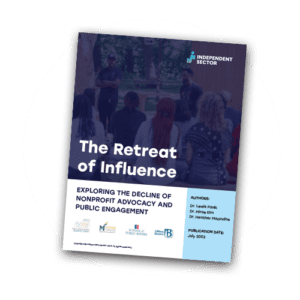Nonprofit Advocacy & Civic Engagement Research
Landmark research on the declining state of nonprofit influence through advocacy and civic engagement
Six Data Highlights
A significantly lower proportion of nonprofits report advocating or lobbying compared to 20 years ago.
Only 31% of nonprofits report engaging in advocacy or lobbying over the last five years, which is less than half of the percentage of nonprofits that reported ever lobbying in 2000 (74%).
Mission plays the largest role in determining nonprofit advocacy and lobbying.
Approximately 70% of policy-engaged nonprofits report their mission encourages their policy engagement. Among nonprofits that do not engage in policy, 56% report policy engagement does not apply to their mission.
Today, significantly fewer nonprofits know the advocacy activities they can legally do, compared to 20 years ago.
In 2000, over half of 501(c)(3) public charities (54%) knew they could support or oppose federal legislation. Today, only 32% of nonprofits are aware of that fact.
Only 13% of nonprofits conduct nonpartisan activities to help people vote.
Among nonprofits that advocate, 1 in 5 provide people with nonpartisan voter information.
Nonprofits that belong to collaborative groups advocate at higher rates than those that are not members.
Of nonprofits that belong to local, state, or national coalitions, 57% advocate or lobby, compared to only 12% of nonprofits that do not belong to such coalitions.
Although a majority of nonprofits have a diversity, equity, and inclusion (DEI) statement, only 36% engage in policy activities to create more equitable systems.
However, policy-engaged nonprofits’ investment of time and resources in DEI activities is much higher than for non-policy-engaged nonprofits.
About
Independent Sector seeks to measure the status of a major pillar of nonprofit sector health: advocacy and civic engagement. We commissioned research to fill a 20-year gap in data around nonprofit advocacy and civic engagement (i.e., nonpartisan voter engagement) activities through a nationally representative quantitative survey and complementary qualitative interviews of nonprofit institutions. The research is designed to provide insights on how advocacy and civic engagement may vary by organization size, geography, communities served, and leadership demographics.
This research complements the only other nationally representative survey on nonprofit advocacy conducted more than 20 years ago, entitled the 2000 Strengthening Nonprofit Advocacy Project (SNAP) Assessment. Our new research will help nonprofit leaders and policymakers see what, if any, progress has been made in nonprofit advocacy and the ability to overcome barriers during the last two decades. It also establishes a new baseline for nonprofit advocacy and civic engagement that includes three new metrics of nonprofit activity: (1) nonpartisan civic engagement, (2) support of social movements, and (3) level of investment in equity work.
Meet the Research Team
- Dr. Lewis Faulk at American University
- Dr. Mirae Kim at George Mason University
- Dr. Heather MacIndoe at University of Massachusetts Boston
Importance of the Research
Nonprofits are a catalyst for democracy and systems change in the United States. Our organizations bring individuals together to educate leaders — particularly policymakers — about our missions, community challenges, and potential solutions. More importantly, for almost 200 years, American nonprofits have helped people use their own voices to share their stories, call for change, and hold leaders accountable.
Advocacy & Civic Engagement is Core to Nonprofit Health
Independent Sector and many experts on nonprofit leadership view nonprofits’ ability to shape their environment through advocacy and civic engagement as a key determinant of nonprofit and sector health because:
- Public policy defines what it means to be and operate as a nonprofit and is a key determinant of an organization’s ability to deliver its mission;
- Public policy and advocacy are critical to addressing the systemic inequities and structural racism that impact the ecosystems in which all nonprofits operate; and
- Research shows public policy as a key characteristic of high-impact nonprofits and ensuring historically marginalized voices are heard as advocates and voters.
Current State of Nonprofit Advocacy
Given the pivotal role of advocacy and civic engagement in advancing nonprofit missions and community needs, it is important to understand the extent to which organizations participate in these types of activities. What types of organizations advocate? What motivates or prohibits them from advocating? What resources do nonprofits need to increase impact and create more equitable systems?
After a more-than-20-year gap, we now have data to answer this question. It’s time to call on sector leaders to dive deep into what the data say about the concerning current state of nonprofit civic engagement — and work side by side to create a plan forward.
Research Report
This research explores the current state of nonprofit advocacy and civic engagement includes two reports:
- a nationally representative survey that illustrates the extent to which U.S– based nonprofits advocate, and
- a qualitative study to explore the underlying reasons why organizations do or do not engage in these activities that are core to the identity of the sector, and that determine the ability of individual organizations to advance their missions.
Qualitative research is currently underway – stay tuned for the findings slated to be released in Fall 2024.
Sharable Resources
Review these additional resources to help you and members of your network quickly understand key findings from this research and what is at stake.
Take Action
The fact that nonprofits’ influence is declining calls for concerted and coordinated action by the sector. Advocacy is about nonprofits working together alongside their communities. The issues raised in this research cannot be solved by a single organization alone.
Following are steps nonprofit leaders can take now to begin addressing issues raised in the report, and to join conversations with other sector leaders. We need broader reforms to sector culture, funding, infrastructure, and policy to strengthen nonprofit influence and ensure the voices of our organizations and the people we serve are heard clearly by community leaders and policymakers now and 20 years from now.

Immediate Opportunities for Action
Develop a Voter Engagement Plan
Only 13% of nonprofits conduct nonpartisan activities to help people vote, despite being more effective than other organization types in getting people across the political spectrum to vote. Use the Nonprofit Voter Empowerment Playbook to develop your organization’s voter engagement plan and increase voter participation.
Clarify Nonprofit Civic Engagement Rules
Significantly fewer nonprofits know the advocacy activities they can legally do today, compared to 20 years ago. This is – in part – due to a lack of clear and understandable rules about what is allowed and what is appropriately prohibited. Learn more about the need to clarify nonprofit civic engagement rules and contact the IS policy team to get involved.
Join Sector Conversations on Long-Term Solutions
Sign up to share your expertise and work alongside other sector leaders to devise long-term solutions addressing the challenges raised in this research about the decline of nonprofit advocacy and public engagement.
